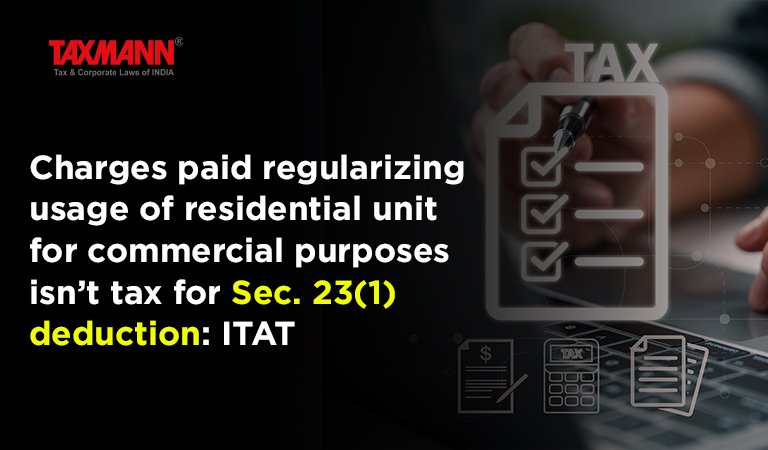Charges paid regularizing usage of residential unit for commercial purposes isn’t tax for Sec. 23(1) deduction: ITAT
- Blog|News|Income Tax|
- 2 Min Read
- By Taxmann
- |
- Last Updated on 7 June, 2022

Case Details: Amar Chand Garg v. ACIT - [2022] 138 taxmann.com 417 (Delhi-Trib.)
Judiciary and Counsel Details
-
- N. K. Billaiya, Accountant Member & Yogesh Kumar US, Judicial Member
- Salil Agarwal, Sr. Adv. for the Appellant.
- Kanav Bali, Sr. DR for the Respondent.
Facts of the Case
The assessee was the joint owner of the property having 50% share and ownership of the said property. During the year under consideration, the assessee had claimed deduction on account of a certain sum paid towards taxes to the Municipal Corporation which included mixed-use charges.
The assessee contended that the annual mixed-use charge was a tax that was payable for making commercial use of property and payment of tax was an allowable expense from rental income as per proviso under section 23(1). However, the Assessing Officer (AO) had disallowed such mixed-use charges as a deduction under section 23(1).
On appeal, the CIT(A) upheld the order of AO. Aggrieved-assessee filed the instant appeal before the Delhi Tribunal.
ITAT Held
The Delhi Tribunal held that the definition of the ‘tax’ under the Delhi Municipal Corporation (Property tax) bye-laws 2004 means and includes only building tax or vacant land tax or both which does not include the ‘annual mixed charges’.
In the instant case, the collection of ‘mixed-used charges’ was to regularize the usage of residential premises for certain commercial purposes as prescribed under the Delhi Development Authority (Fixation Of Charges For Mixed Use And Commercial Use Of Premises) Regulations, 2006.
The said charges were in the nature of regularization of the usage of the property and cannot be construed as tax levied by the local authority/Municipal Corporation of Delhi.
Since the collection of the annual mixed-used charge will not make any difference in the annual let-out value of the property, therefore the same was not allowable as deduction under section 23(1).
Disclaimer: The content/information published on the website is only for general information of the user and shall not be construed as legal advice. While the Taxmann has exercised reasonable efforts to ensure the veracity of information/content published, Taxmann shall be under no liability in any manner whatsoever for incorrect information, if any.

Taxmann Publications has a dedicated in-house Research & Editorial Team. This team consists of a team of Chartered Accountants, Company Secretaries, and Lawyers. This team works under the guidance and supervision of editor-in-chief Mr Rakesh Bhargava.
The Research and Editorial Team is responsible for developing reliable and accurate content for the readers. The team follows the six-sigma approach to achieve the benchmark of zero error in its publications and research platforms. The team ensures that the following publication guidelines are thoroughly followed while developing the content:
- The statutory material is obtained only from the authorized and reliable sources
- All the latest developments in the judicial and legislative fields are covered
- Prepare the analytical write-ups on current, controversial, and important issues to help the readers to understand the concept and its implications
- Every content published by Taxmann is complete, accurate and lucid
- All evidence-based statements are supported with proper reference to Section, Circular No., Notification No. or citations
- The golden rules of grammar, style and consistency are thoroughly followed
- Font and size that’s easy to read and remain consistent across all imprint and digital publications are applied



 CA | CS | CMA
CA | CS | CMA
